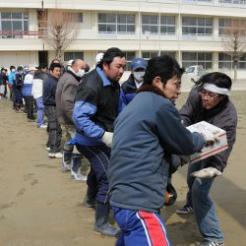Andrew Chaggar, a tsunami survivor and head of disaster relief charity European Disaster Volunteers, has been transfixed watching Japan's circumstances unravel, but will not be rushing in to help. Here he explains why...
On Friday 11th March the fifth largest earthquake in recorded history struck off the Japanese coast. The resultant tsunami waves, reported as over 10 metres high, slammed into the country’s north-eastern prefectures causing huge damage to buildings, roads and bridges. Over 20,000 are reported dead or missing.
To add further misery, damage to nuclear plants have prompted fears of radiation leaks and are contributing to power cuts in the middle of wintry weather.
As a survivor of the 2004 tsunami, and now director of an international disaster response charity, I’ve obviously been following the news closely. The imagery has evoked strong memories for me and were I not committed to my on-going work in Haiti it would be very tempting to follow my “humanitarian impulse” and try to personally help in Japan.
However, from a professional standpoint, I am forced to acknowledge that this may not be the best course of action.
For disaster responders the general rule of thumb to judge if international intervention is appropriate is whether or not a disaster exceeds the local capacity to cope. If national authorities and civil society can meet local needs then external help generally isn’t warranted.
While the situation is undoubtedly awful for survivors of this disaster, Japan is the most disaster-prepared country in the world and this is reflected in the response of both the national government and of many of the international agencies and NGO’s who would usually rush to provide aid.
Japan has refused most humanitarian assistance
The Japanese government has not requested humanitarian assistance. While it has reportedly received offers from 14 international organisations and 102 countries, only 15 (at the time of writing) have been accepted. The offers which have been taken up are mostly from highly-specialised urban search and rescue teams.
As a result the response of many major international groups is relatively limited. For example a United Nations Disaster Assessment and Coordination (UNDAC) team has deployed but under a restricted mandate. Its role will be to assist the government with disseminating information to the international community and to help limit unsolicited donations. Further, the UN Office for the Coordination of Humanitarian Affairs (OCHA) has stated:
“Japan is responding to three emergencies - the earthquake, tsunami and nuclear threat - and is doing very well”
In the UK, not only does the Disasters Emergency Committee’s website state that they are not planning to launch an appeal but Celina Ribeiro (for Civil Society) reports that they definitely won’t be. While several of their thirteen individual members are responding this is either through channeling funds to, or supporting, their Japanese counterparts rather than through independent action.
In the USA, the Chronicle of Philanthropy recently reported on the status of many organisations ready to help. However, if you read the article the common theme is that almost all are waiting on requests from Japan - which have yet to be forthcoming.
My point here is that, even as a survivor of a tsunami myself, knowing how devastating their effects can be, it is important to recognise that Japan can most likely withstand this disaster with only very specialised external help needed.
Of course, should help be requested, or simply welcomed, then I would encourage everyone to do what they can. However, until this happens I believe that the capacity of the Japanese to meet their own needs should be respected.
Andrew Chaggar is executive director of European Disaster Volunteers which he co-founded in 2008, and is a 2010 Vodafone Foundation World of Difference International winner.









